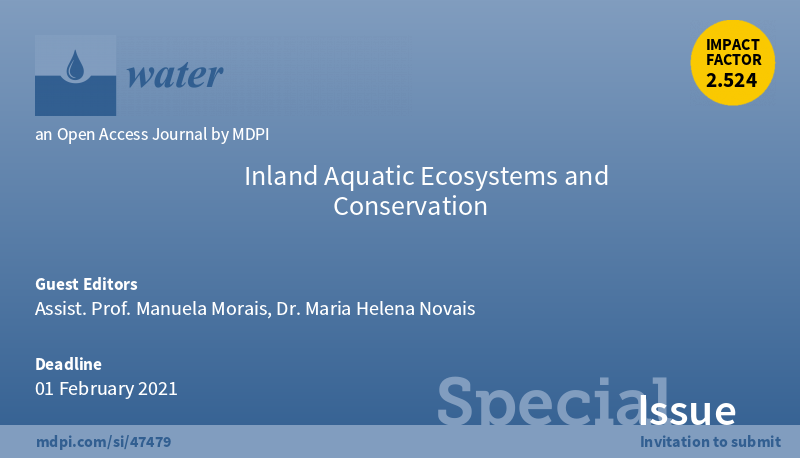Guest Editors:
Assist. Prof. Manuela Morais Department of Biology, University of Évora/Instituto de Ciências da Terra, Rua Romão Ramalho, 59, 7002–554 Évora, Portugal
mmorais@uevora.pt
Dr. Maria Helena Novais Renewable Energies Chair— University of Évora, Casa Cordovil, Rua D. Augusto Eduardo Nunes nº7, Évora, 7000651, Portugal
hnovais@uevora.pt
Editor-in-Chief:
Dr. Jean-Luc PROBST ECOLAB, Centre National de la Recherche Scientifique (CNRS), University of Toulouse, campus ENSAT, Auzeville Tolosane, France
Deadline for manuscript submissions: 1 February 2021
Inland aquatic ecosystems comprise natural and manmade water bodies, including rivers, streams, lakes, ponds, floodplains, reservoirs, and irrigation channels, among others. These systems are subject to a variety of anthropogenic threats worldwide, and some of them are already irreversibly damaged. So far, human activities and disturbances, including inappropriate land use practices, pollution, basin disturbances, invasive species, and climate change, have fragmented aquatic habitats, disrupting the natural functioning of both physical and ecological processes and degrading biodiversity and water quality. Nevertheless, it is recognized that these ecosystems are a biodiversity hotspot which supports almost 10% of all species, while also providing numerous economic benefits to society.
At a global scale, the current broad policy landscape, such as the EU Water Framework Directive and the Habitats Directive, among others, imply that sustainable management requires integrated solutions to manage aquatic ecosystems as truly social-ecological systems.
This Special issue will address different actions that lead to the conservation of these ecosystems.
Therefore, we invite papers focusing on the improvement of knowledge, the disclosure of effective practices to mitigate the anthropogenic threats, and the proposal of restoration solutions to enhance the resilience of aquatic ecosystems and contribute to aquatic biodiversity, as well as to ensure the ongoing provision of ecosystem services.
Message from the Editor-in-Chief:
In the context of global changes, the sustainable management of water cycles, going from global and regional water cycles to urban, industrial and agricultural water cycles, plays a very important role on the water resources and on their relationships with food, energy, biodiversity, ecosystem functioning and human health.
Water invites authors to provide innovative original full articles, critical reviews and timely short communications and to propose special issues devoted to new technological and scientific domains and to interdisciplinary approaches of the water cycles.
We ensure a critical review process and a quick turnaround between submission and final decision.
More information here.

